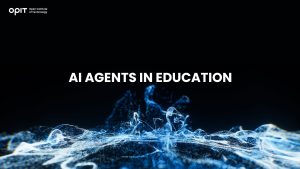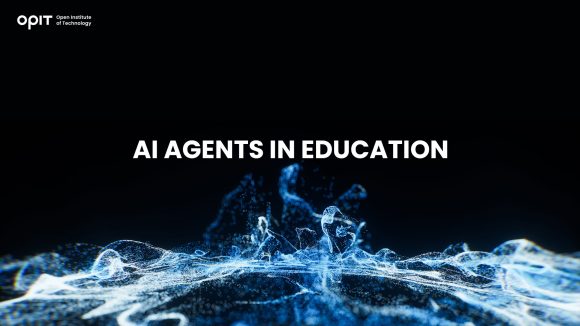

In many ways, the concept of education has remained the same over the millennia – the experienced and learned passing on their knowledge and wisdom to new generations. And some of the biggest revolutions in teaching and learning have been brought about by technology: from the printing press to computers to the internet, they have all changed and democratized the process of teaching and learning. Now, artificial intelligence (AI) is emerging as the next big game-changer.
The emerging role of AI agents in education is the subject of a new e-book released by the Open Institute of Technology (OPIT). Going beyond simple AI tools, such as ChatGPT’s generative AI, the e-book looks at how sophisticated AI agents can be deployed as education allies, both in the general sense and referencing OPIT’s AI Copilot as a specific case study.
So, what can you expect to learn from OPIT’s e-book?
What Are AI Agents?
The e-book starts by explaining the concept of AI Agents. These are AI tools that go beyond simple “if a then x but if b then y” reasoning. Instead, they can work autonomously towards specified goals, with very little need for user intervention. To achieve this, the AI Agent must be able to perceive, make decisions, act, and adapt.
What those four steps look like in action depends on how the AI Agent is employed. Let’s take the example of an AI Agent deployed to deliver IT support, integrated with the IT system’s knowledge and user management system.
The AI Agent will perceive the nature of the problem from requests for help submitted by users, reading and understanding written requests, and also potentially gathering data directly from devices if they are networked. It then integrates this input with its IT system knowledge to understand the nature of the problem and the required solution.
The AI Agent will then decide the best way to solve the problem and plan what steps need to be taken. It should then be able to act. For example, it can verify the user’s identity and begin the password reset process, send detailed information to the user explaining how to solve the problem, or issue a ticket with the important information to the appropriate human IT specialist.
Based on outcomes, the AI Agent will assess its success in completing this task and incorporate that information into its knowledge base.
As well as saving time and money on these tasks, AI Agents can be more efficient, as they work continuously and reduce human error, especially for repetitive and mundane tasks. Scalability is another advantage of AI Agents, as they can be easily scaled up or down when workloads fluctuate.
AI Agents in Education
AI Agents can be deployed in education scenarios to achieve a number of different tasks, which is something that OPIT is doing with its OPIT AI Copilot.
These can be programmed to work as virtual teachers or study assistants that are available 24/7 and deliver personalized learning plans. For example, the OPIT AI Copilot is trained on OPIT’s library of educational content, including over 5,000 lectures and 3,500 hours of video content across 131 courses. From this base, it can show students the content they need to study based on their current stage in the course and answer questions posed by the student through a natural language interface.
If the student is struggling with concepts, the AI Agent can produce alternative learning materials that may work better with the student’s learning style. For advanced students, it can bring in related content that connects to their interests and understanding.
The AI Agent can help students prepare for exams by creating practice tests and issuing grades, even for long-form answers based on factors such as grammatical accuracy and the presence of essential concepts in the response. This kind of immediate feedback has been shown to improve student results over time.
The AI Agent is also useful for teachers, who can use it for grading simple tests and as a fairness check when grading large numbers of more complex papers. It can alert teachers when students are struggling and might benefit from direct intervention, and can identify course materials that are proving problematic for the cohort as a whole, flagging them up for review.
There are many other potential applications, such as creating virtual tours of lost or distant historical sites, virtual discussion moderation, resource gathering for assignments, and organizing references in the required format.
The Benefits of AI Agents in Education
The e-book takes a deep look at both the benefits and potential issues of AI in education. Some of the clearest benefits are personalized learning that moves beyond “one-size-fits-all” approaches and improved accessibility. At the same time, there are concerns around algorithmic bias impacting learning and reduced critical thinking due to over-reliance on AI tools.
But this is why the e-book emphasizes that AI is not a replacement for human teachers, but a tool that can be used to enhance the learning environment. OPIT devotes a chapter to discussing how teachers are becoming curators of dynamic teaching environments that leverage a variety of tools, including AI, to create stimulating and accessible learning spaces.
Essential to this is teaching students how to work with AI, when it is appropriate and when it can be a hindrance, and how to critically assess the content produced and delivered by AI. This is an essential skill for the future as AI becomes more prevalent in every aspect of our lives, and we must critically assess its outputs.
AI Agents Empowering Learning
Overall, the e-book assesses how AI Agents are being leveraged to empower both teachers and students in the education space. The recently released OPIT AI Copilot is one of the examples discussed in the e-book, but it is just the beginning. We fully expect more complex and sophisticated education AI Agents to emerge as the AI Agents, teachers, and students gain a better understanding of their capabilities. It is an exciting time to be in education.
Related posts

Source:
- Times of Malta, published on September 18th, 2025
4 min read
The gathering brought together academics and technology leaders from prominent European Institutions, such as Instituto de Empresa (IE University), OPIT itself and the Royal College of Arts, to explore how artificial intelligence is reshaping the university experience.
The OPIT AI Copilot has been trained on the institute’s complete academic archive, a collection created over the past three years that includes 131 courses, more than 3,500 hours of recorded lectures, 7,500 study resources, 320 certified assessments, and thousands of exercises and original learning documents.
Unlike generic AI tools, the Copilot is deeply integrated with OPIT’s learning management system, allowing it to track each student’s progress and provide tailored support.
This integration means the assistant can reference relevant sources within the learning environment, adapt to the student’s stage of study, and ensure that unreleased course content remains inaccessible.
A mobile app is also scheduled for release this autumn, that will allow students to download exercise and access other tools.
During examinations, the Copilot automatically switches to what the institute calls an “anti-cheating mode”, restricting itself to general research support rather than providing direct answers.
For OPIT’s international community of 500 students from nearly 100 countries, many of whom balance studies with full-time work, the ability to access personalised assistance at any time of day is a key advantage.
“Eighty-five per cent of students are already using large language models in some way to study,” said OPIT founder and director Riccardo Ocleppo. “We wanted to go further by creating a solution tailored to our own community, reflecting the real experiences of remote learners and working professionals.”
Tool aims to cut correction time by 30%
The Copilot will also reduce administrative burdens for faculty. It can help grade assignments, generate new educational materials, and create rubrics that allow teachers to cut correction time by as much as 30 per cent.
According to OPIT, this will free up staff to dedicate more time to teaching and direct student engagement.
At the Milan event, Rector Francesco Profumo underlined the broader implications of AI in higher education. “We are in the midst of a deep transformation, where AI is no longer just a tool: it is an environment that radically changes how we learn, teach, and create,” he said.
“But it is not a shortcut. It is a cultural, ethical, and pedagogical challenge, and to meet it we must have the courage to rethink traditional models and build bridges between human and artificial intelligence.”
OPIT was joined on stage by representatives from other leading institutions, including Danielle Barrios O’Neill of the Royal College of Art, who spoke about the role of AI in art and creativity, and Francisco Machin of IE University, who discussed applications in business and management education.
OPIT student Asya Mantovani, also employed at a leading technology and consulting firm in Italy, gave a first-hand account of balancing professional life with online study.
The assistant has been in development for the past eight months, involving a team of OPIT professors, researchers, and engineers.
Ocleppo stressed that OPIT intends to make its AI innovations available beyond its own institution. “We want to put technology at the service of higher education,” he said.
“Our goal is to develop solutions not only for our own students, but also to share with global institutions eager to innovate the learning experience in a future that is approaching very quickly.”

From personalization to productivity: AI at the heart of the educational experience.
Click this link to read and download the e-book.
At its core, teaching is a simple endeavour. The experienced and learned pass on their knowledge and wisdom to new generations. Nothing has changed in that regard. What has changed is how new technologies emerge to facilitate that passing on of knowledge. The printing press, computers, the internet – all have transformed how educators teach and how students learn.
Artificial intelligence (AI) is the next game-changer in the educational space.
Specifically, AI agents have emerged as tools that utilize all of AI’s core strengths, such as data gathering and analysis, pattern identification, and information condensing. Those strengths have been refined, first into simple chatbots capable of providing answers, and now into agents capable of adapting how they learn and adjusting to the environment in which they’re placed. This adaptability, in particular, makes AI agents vital in the educational realm.
The reasons why are simple. AI agents can collect, analyse, and condense massive amounts of educational material across multiple subject areas. More importantly, they can deliver that information to students while observing how the students engage with the material presented. Those observations open the door for tweaks. An AI agent learns alongside their student. Only, the agent’s learning focuses on how it can adapt its delivery to account for a student’s strengths, weaknesses, interests, and existing knowledge.
Think of an AI agent like having a tutor – one who eschews set lesson plans in favour of an adaptive approach designed and tweaked constantly for each specific student.
In this eBook, the Open Institute of Technology (OPIT) will take you on a journey through the world of AI agents as they pertain to education. You will learn what these agents are, how they work, and what they’re capable of achieving in the educational sector. We also explore best practices and key approaches, focusing on how educators can use AI agents to the benefit of their students. Finally, we will discuss other AI tools that both complement and enhance an AI agent’s capabilities, ensuring you deliver the best possible educational experience to your students.
Have questions?
Visit our FAQ page or get in touch with us!
Write us at +39 335 576 0263
Get in touch at hello@opit.com
Talk to one of our Study Advisors
We are international
We can speak in:
